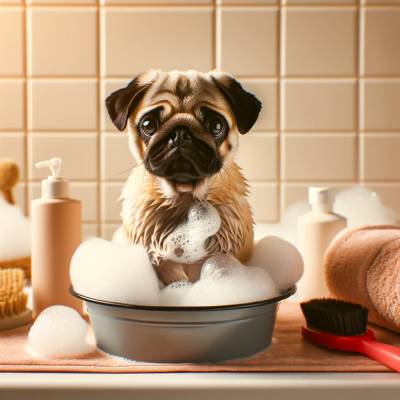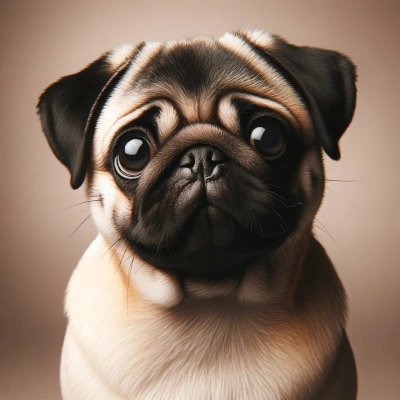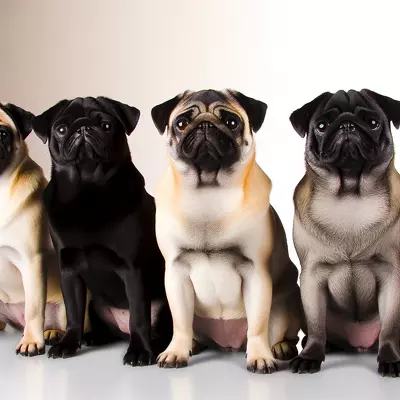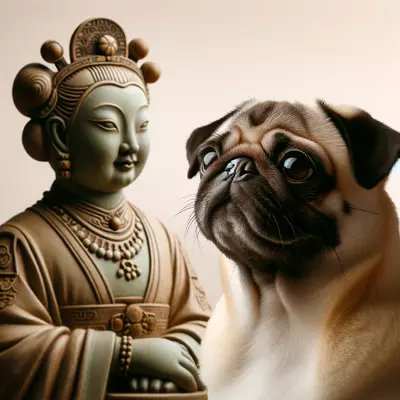Unraveling the Mystery: Are Pugs Smelly Dogs or Just Misunderstood Companions?

Pugs, a beloved breed known for their distinct features and charming personalities, also have a reputation that concerns potential owners: their tendency to emit odors. This article explores the various factors contributing to this perception, examining both the physical characteristics of pugs and their grooming needs. Understanding these elements is crucial for current or prospective pug owners aiming to manage and mitigate this issue effectively.
I. Introduction to Pug Odors
A. Overview of Pug Characteristics
Pugs are a unique breed, instantly recognizable for their short, wrinkled faces and expressive eyes. These small, stocky dogs are known for their playful and affectionate nature, making them popular companions. Their physical traits, including a compact body and brachycephalic (flat-faced) structure, contribute to their distinct personality and care requirements.
B. Common Perceptions About Pug Smell
The notion that pugs are particularly smelly dogs is a topic of interest for many potential and current pug owners. This perception stems from various factors related to the breed’s physical characteristics and care needs. Understanding the truth behind this belief is essential for those looking to welcome a pug into their home.
II. Factors Contributing to Pug Odors
A. Skin Folds and Their Care
One of the most distinctive features of pugs is their deep skin folds. While these folds are a breed hallmark, they require meticulous care to prevent odor. Moisture and debris can easily become trapped within these folds, leading to bacterial growth and a musty smell if not cleaned regularly.
B. Diet and Its Impact on Odor
A pug’s diet plays a significant role in their overall health and scent. Foods that are high in certain ingredients can exacerbate odor issues, either through the skin or in the form of flatulence. Selecting the right diet for a pug can help mitigate these issues, contributing to a healthier and less odorous pet.
C. Glandular Secretions and Health Conditions
Pugs, like many dogs, have anal glands that can emit a strong odor if they become impacted or infected. Additionally, certain health conditions common in the breed, such as allergies or skin infections, can lead to increased odor. Regular veterinary check-ups are crucial in identifying and treating these issues promptly.
III. Grooming and Hygiene Practices
A. Regular Bathing and Its Importance
Regular bathing is critical in managing a pug’s odor. However, due to their sensitive skin, it’s important to find a balance that cleanses without causing dryness or irritation. Using the right shampoo and bathing frequency can keep a pug’s coat fresh and reduce unpleasant smells.
B. Cleaning Skin Folds and Ears
In addition to regular baths, pugs require frequent cleaning of their skin folds and ears. These areas are prone to accumulating dirt and moisture, leading to odor and potential infections. A gentle, regular cleaning routine is essential for maintaining the health and freshness of these sensitive areas.
C. Dental Hygiene and Its Role in Preventing Odors
Dental hygiene is another critical aspect of a pug’s grooming routine. Poor dental health can lead to bad breath and other health issues. Regular teeth brushing, along with professional dental cleanings as recommended by a veterinarian, can help prevent oral odors and maintain overall health.
IV. Living with a Pug
A. Home Hygiene Strategies
Maintaining a clean environment is important when living with a pug. Regular vacuuming and cleaning of pet bedding and areas can help reduce the accumulation of odors in the home. Air cleaners and odor neutralizers can also be effective in maintaining a fresh environment.
B. Choosing the Right Grooming Products
Selecting the right grooming products is essential for pug care. Products should be gentle, hypoallergenic, and suitable for sensitive skin. Consulting with a veterinarian or a professional groomer can help in choosing products that are both effective and safe for pugs.
C. When to Consult a Veterinarian
Regular veterinary check-ups are vital for pug health and odor management. If a pug develops a persistent or unusual odor, it may be a sign of an underlying health issue. Early consultation with a veterinarian can ensure proper diagnosis and treatment, keeping the Pug healthy and as odor-free as possible.
V. FAQs
Q: How do I stop my Pug from smelling?
A: Regular grooming, including bathing with suitable dog shampoo, cleaning skin folds and ears, and maintaining dental hygiene, can significantly reduce odor. Additionally, ensure a balanced diet and seek veterinary advice for any underlying health issues.
Q: Can pugs smell well?
A: Despite their short snouts, pugs generally have a good sense of smell. Their brachycephalic nature doesn’t significantly hinder their olfactory capabilities compared to other dog breeds.
Q: Why does my Pug stink even after a bath?
A: If your Pug still smells after a bath, it could be due to uncleaned skin folds, dental issues, or anal gland problems. Regular cleaning of folds and ears, dental care, and veterinary check-ups can address these issues.
Q: Why does my male Pug smell like fish?
A: A fishy smell in male pugs is often linked to anal gland issues. These glands can become impacted or infected, emitting a fishy odor. A vet can express these glands and treat any infections.
Q: Are certain pugs more prone to smelling than others?
A: Pugs can only develop odors if properly groomed and cared for. However, those with more pronounced skin folds or health issues may require more attention to prevent smells.
Q: Does the weather affect a pug’s smell?
A: Yes, warmer and more humid conditions can exacerbate odors, as they promote bacterial growth, especially in skin folds. Increased grooming during such weather can help manage odors.
Q: Is it normal for a pug’s smell to change with age?
A: Yes, a pug’s scent may change as they age due to varying health and hormonal factors. Regular veterinary check-ups are important to monitor and address any age-related changes.
VI. Conclusion
A. Balancing Care with Enjoying Your Pug
Owning a pug is a delightful experience filled with affection and companionship. By understanding and implementing proper grooming and health care, owners can effectively manage any odor issues, allowing them to enjoy the unique personality and charm of their Pug fully.
B. Understanding and Managing Pug Odors
Recognizing the causes of pug odors and the effective methods to manage them is key for any pug owner. With the right knowledge and care, pugs can be as fresh and clean as any other breed, making them wonderful pets for individuals and families alike.
VII. Suggested Readings
Before selecting a pug as a pet, it’s beneficial to delve into resources that can provide deeper insights into their care, health, and unique characteristics. The following books offer valuable information for current and prospective pug owners:
- “The Pug Handbook” by Brenda Belmonte – A comprehensive guide covering all aspects of pug care, from grooming to health management.
- “Pugs for Dummies” by Elaine Waldorf Gewirtz – An accessible and informative book offering tips and advice for both new and experienced pug owners.
- “Pug Health Guide: Understanding and Caring for Your Pug” by Dr. Caroline Coile – This book focuses on the specific health needs and issues common in pugs, providing expert advice for their well-being.
- “Complete Pug” by Kim Campbell Thornton – A detailed exploration of the breed, including its history, temperament, and care requirements.
- “The Essential Guide to Owning a Pug” by Diane Morgan – Offers practical advice on training, feeding, grooming, and understanding the unique traits of pugs.
These books provide a wealth of information, helping owners not only address the question of odor but also to ensure the overall happiness and health of their Pug. Through these resources, pug owners can deepen their knowledge and enhance their experience with this charming and affectionate breed.






